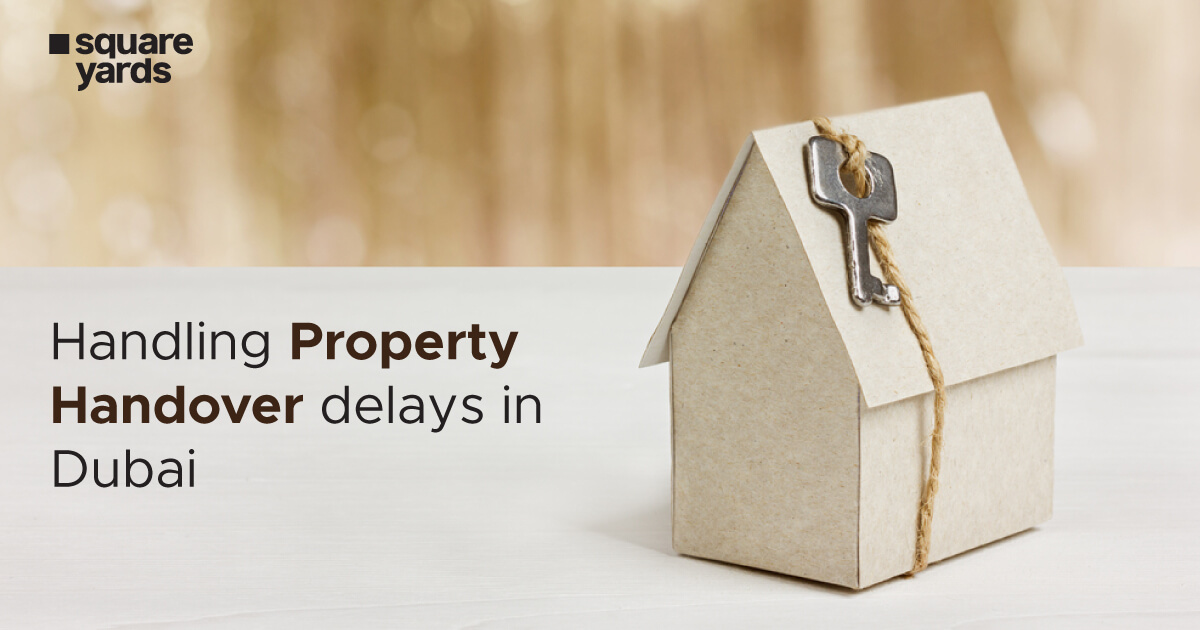Nowadays, several investors or purchasers are facing property handover delays in Dubai. The Dubai Land Department is currently handling several similar cases. However, it all depends upon the conditions and clauses mentioned in the contract. In case, a condition in the contract removes that liability for any uncertain situation, the investor cannot terminate the developer or claim any compensation. But if the property handover delays in Dubai beyond a reasonable time cited in the contract, an investor can claim repayment. You are also facing a similar issue following the steps to tackle the property handover delays in Dubai.
Legal Action For Property Handover Delay in Dubai

You must take the following actions to handle property handover delays in Dubai.
-
Presence of a Compensation Clause
The contract between you and the developer should include a compensation clause. The contract will be considered as the legal representation of the agreement. If anything happens, the court will consider the contract.
-
Have Made The Initial Payments
The property handover must be done after the completion of the payment process as per the agreement. However, if you can’t complete payments due to any circumstance, the developer has the authority to hold the property handover. Therefore, making complete payments will remove you from any blame from the developer’s end.
-
Visit The Project Site
Before investing, you must visit the project site and inspect the progress by yourself regularly (even after investing). This will help you get a better idea about the project handover. And, if you feel that there will be a delayed property handover in Dubai, you can contact the developer.
-
Check For RERA
RERA Dubai to cancel the projects which fall under the government’s planning map. Thus, you must check about the land before investing. For this issue, the liquidation committee transfers the compensation to the Dubai Real Estate Courts.
-
Negotiation with The Developer

If the project is not annulled, the best step is to haggle with your developer and come to a common solution favourable to both. Another legal action for property handover delay in UAE is to check the contract or SPA (Sale and Purchase Agreement). In the contract, you will see a clause stating the next step if the property handover is delayed. This clause will benefit you in negotiations and legally guide you as well.
-
Case Filing Against The Developer
If something else doesn’t work better for you, you can file a case against the developer in the Dubai Law Courts. Make sure to hire a proper lawyer to represent you in court.
Steps To Avoid Property Handover Delays in Dubai

You can take the following steps to avoid any property handover delays in Dubai:
-
Research About the Developer
It is crucial for you to know who you are getting into a contract with within the real estate industry. You can learn more about their work and ‘reputation regarding the development and handover of the property.
-
Register Government’s Project
Ensure that you and the developer is registered with RERA. It will work as evidence in a case with the Dubai Land Department.
-
Make Payments via Escrow
All the registered developers with the Dubai government-owned an escrow account which is further registered with Dubai Lands Department. Therefore, all the payments should go through this account to sell off units.
-
Confirm Developer’s Permits
Make sure your developer has access to and authority to work in Dubai. If not, you might lose a huge amount of money, and the project will become life-threatening.
-
Take Time with the Contract
Before signing any contract with the developer, it is crucial to read every clause and condition carefully. You have to ensure that the agreement protects you from any losses. Further, with the assistance of a good lawyer, you will be able to get your property handover delays in Dubai within a short period. Also, ensure that you do not make any false or dishonest clauses while entering a contract with the developer.
Legal Options For Property Handover Delays in Dubai
You can check out the steps you can take to deal with the delayed property handover in Dubai.
-
Termination of The Agreement
You can terminate the contract if there is a delay in handing over the property even after the time cited in the contract. However, it is important to look into the term and conditions of the contract.
-
Claiming Compensation For Such Delays
As a purchaser, you can claim some compensation for a delayed property handover as written in the contract. However, the investor has to prove that the delay has caused him a loss. The person can claim compensation for interest, deposit, agent fees, any extra amount, or any other amount as per UAE laws.
-
Reasonable Delay
The court can decide on the investor’s side if the property handover is delayed for more than two years.
Conclusion
Now, you know what steps and legal actions to take if there are any property handover delays in Dubai. You can ask for compensation, terminate the agreement, and file a case. Moreover, if you are planning to file a case, hire good property lawyers with past experience regarding delayed property handover in Dubai.
Recommended For You :
| What is New UAE Labour Law? | New UAE Labour Law 2022 |
| All About Real Estate Laws in Dubai | Real Estate Laws in Dubai |
| Dubai Tenancy Laws | Dubai Tenancy Laws |
| Guide To Abu Dhabi Property Laws | Abu Dhabi Property Laws |
| Guide To Jointly Owned Property Laws Dubai | Jointly Owned Property Laws Dubai |
| Buy Property Direct From Owner in Dubai | Buy Property Direct From Owner |
| Guide To Sell Your Property in Dubai | Sell Your Property in Dubai |
|
Taxes and Fees For Property Purchases in UAE |
Frequently Asked Question (FAQs)
You can claim compensation for the property handover delays in Dubai if such clauses are in your contract. If not, you can claim settlement for the interest, deposit, or any additional amount paid by you.
Dubai Land Department deals with property issues.
Yes, Dubai authorities can charge penalties for delayed property handover in Dubai. Moreover, it doesn't matter whether the completion date is documented or not in the contract.
4. Yes, you can sue a builder for poor workmanship. Can I claim compensation for a delayed handover?
Name the department that deals with property issues in Dubai.
How do Dubai authorities charge penalties for delayed property handover?
Can I take legal action against a builder for poor workmanship?




